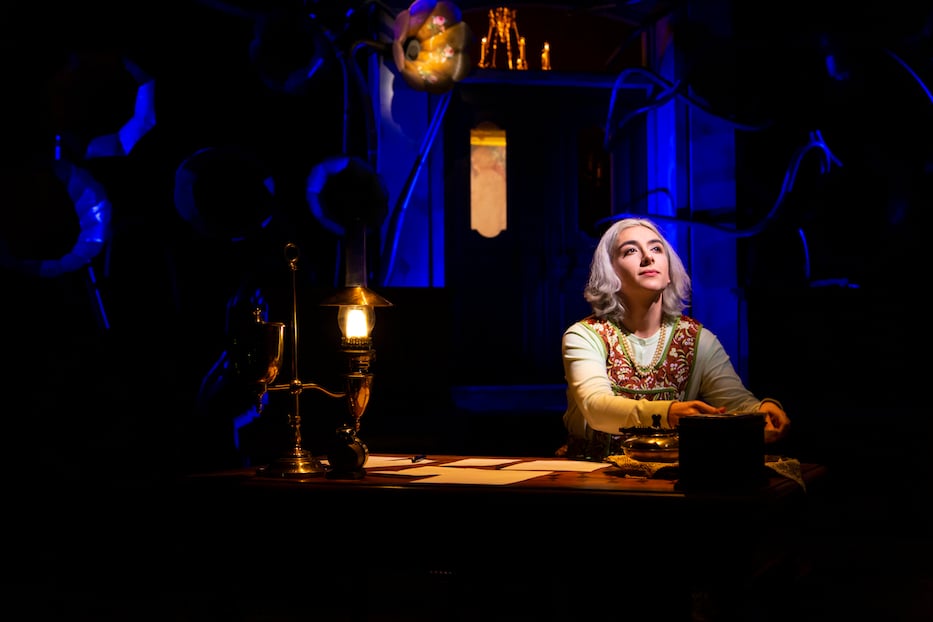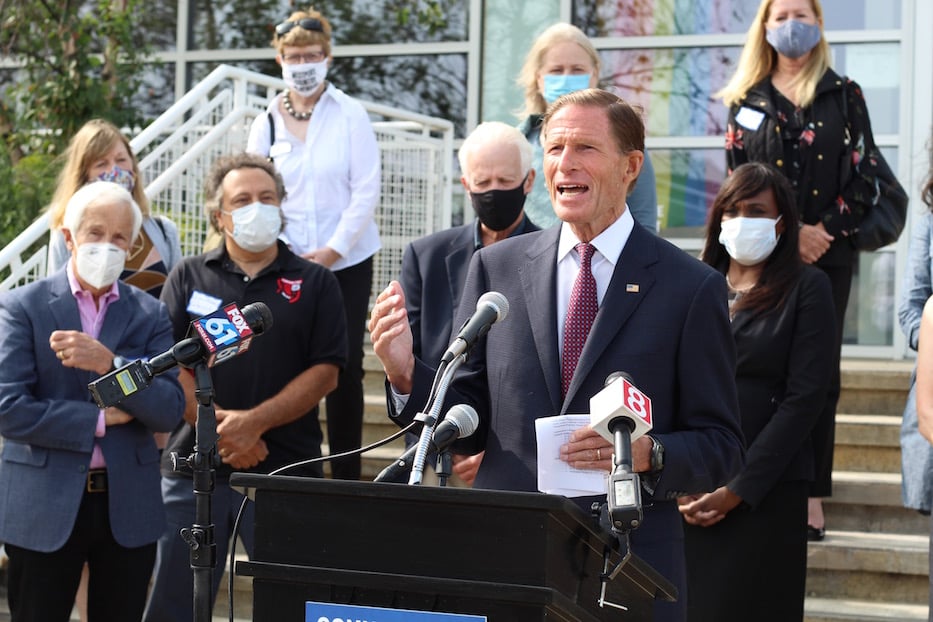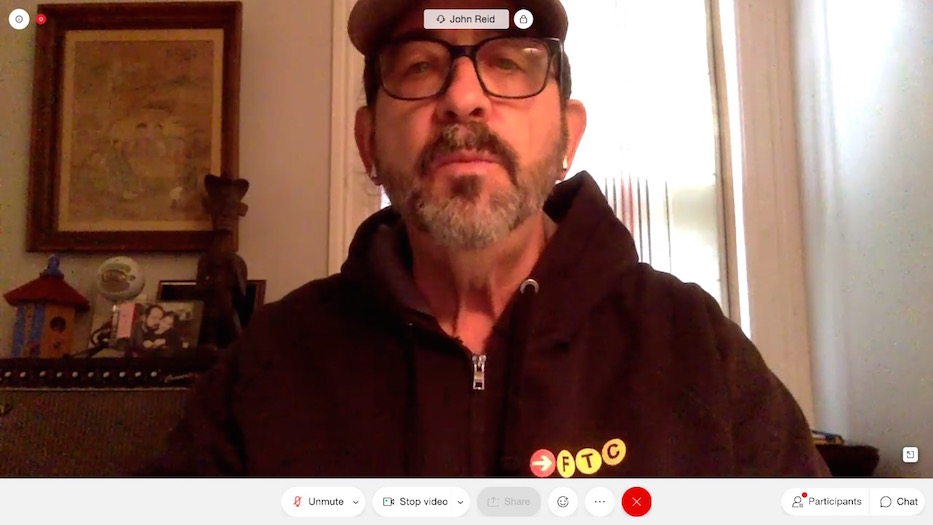
Economic Development | Politics | Arts & Culture | Theater | COVID-19

Screenshot from Webex.
As Congress continues to debate a $916 billion federal stimulus package in Washington, U.S. Sen. Richard Blumenthal is turning to Connecticut theater makers and music venues with the hope that their stories can help push it over the finish line.
Artistic directors from across the state joined Blumenthal Wednesday afternoon, in a video call to discuss the Save Our Stages (S.O.S) Act and need for sustained and immediate federal relief to keep their doors open.
Close to two dozen arts leaders logged on to the call, including representatives from the Bushnell Performing Arts Center, Long Wharf Theatre, Fairfield Theatre Company, Wall Street Theatre and others. Each detailed for the senator how their respective creative institutions are on the brink of collapse.
“We know how to make one dollar do 50 dollars worth of work,” said Hugh Hallinan, executive director and producer of the Downtown Cabaret Theatre in Bridgeport. “But the string is already broken. We fell to the bottom of the elevator shaft about three months ago. We’ve gotta survive to climb back out of this whole. The people that run the organization have to somehow stay whole to somehow bring it back together again.”
Blumenthal said that he has spent days arguing for the stimulus funding and for the act, which has gained widespread bipartisan support since it was first proposed in July. He called himself cautiously optimistic that the relief package, an “emaciated” version of the $2.2 trillion package that House Democrats pushed for in October (down from $3.4 trillion in May), may pass before Congress heads home for the holidays.
“I have seen firsthand the pain and grief that the pandemic has continued to cause,” he said. “We are in the midst of another surge, which puts in doubt the possibility of your reopening. Whatever happens in this emergency rescue package, it is a rescue package. It is a bridge to the next administration.”

Blumenthal speaking in support of the S.O.S. Act at Long Wharf Theatre in September. Lucy Gellman File Photo.
By Wednesday night, the House of Representatives had approved a temporary stopgap spending bill so that funding negotiations could continue through next Friday. Blumenthal said that any dimming hopes for relief rest with Senate Majority Leader Mitch McConnell, who has proposed sweeping cuts to the package.
“You’ve seen the food lines,” he said. “You’ve seen the testing lines. We still don’t have a testing strategy. I’ve seen the pain and grief that you have. This package is imperative as an emergency rescue.”
As a small part of that funding, the Save Our Stages Act would allow the U.S Small Business Administration (SBA) to make grants of up to $12 million to eligible performing arts venues and operators, such as theaters and concert halls. It would also allow the SBA to re-grant additional funding to those institutions at 50 percent of the original amount.
It was initially introduced by U.S. Sen. John Cornyn, a Texas Republican, and U.S. Sen. Amy Klobuchar, a Minnesota Democrat, in late July. Blumenthal, who was one of the first co-sponsors to sign on, has voiced his support for the item in press conferences at the Warner Theatre in Torrington, Bushnell Theatre in Hartford, and Long Wharf Theatre in New Haven. There are now 56 sponsors for the bipartisan bill, the most recent of whom joined Tuesday.
Wednesday, artistic directors, small venue owners, arts administrators and chief executive officers all joined the plea for relief. David Fay, president and chief executive officer of the Bushnell Performing Arts Center in Hartford, noted that a whole artistic ecosystem is now at stake, from tiny performing arts venues to Broadway-sized stages, performance halls, and stadiums.

“The ecology of our entertainment, arts. and culture enterprise really begins with the smallest club where a singer begins to cut their teeth, and then goes all the way up to someone who performs at Wembley or the XL Center,” he said.
A year ago, Hartford was on a path to economic vibrancy. Now it’s a ghost town, he said. Although the theater’s doors have remained closed, he’s made it a point to come downtown to see how things are faring. He called it “kind of a sad state of affairs when I’m like one of three cars on the block.”
Fay added that he’d also like to see Blumenthal talking to Gov. Ned Lamont and the state legislature about more sustainably funding the arts on a statewide basis. Currently, the arts are funded through direct line items and a series of grants through the Connecticut Office of the Arts. Last month, the state distributed $9 million in federal CARES Act funding for arts organizations across the state. Of that amount, the Bushnell received $480,000.
Fay argued that the amount doesn’t accurately reflect the contributions that artists and arts venues make to the state. Prior to March, arts and culture represented a $9 billion sector, accounting for 57,000 jobs and five percent of the state’s economy. When the state of Oregon allocated its CARES Act dollars earlier this year, it reserved $50 million for the arts with the understanding that the sector represents a large return on investment.
GoodWorks Entertainment Founder Tyler Grill pointed to statewide economic losses that will follow theater closures, from restaurants and bars to clothing stores. John Reid, producing artistic director and executive director at the Fairfield Theatre Company, added that he sees state arts organizations heading towards economic collapse without relief. As they go, so does economic development in the state.

“All of us want to put on a very brave face,” he said. “I don’t think I have a colleague here who wants to be funded in front of a social service need or the poor. I think I could say that most of us really want to assure people that it’s going to be alright.”
But he doesn’t know that, he continued. Very few theaters and performing arts venues do at this point. When COVID-19 hit Connecticut in March, performing arts venues were some of the first to close. Despite the promise of a vaccine, they may be some of the last to reopen due to restrictions on capacity. Some of them may not hold out for that long. Others aren’t sure that a vaccine will be enough to get patrons to come back.
Hallinan said that his space is teetering on the edge of bankruptcy. Each month, he gets a note from his landlord that the rent is due. Each month, he doesn’t know if he’ll be able to pay for it. Earlier this fall, the theater raised enough through donations to pay rent into April of next year. After that, he said he isn’t sure what will happen. With performances on hold, he’s the only staff member left standing.
After over an hour of discussion, Blumenthal said that he planned to take Wednesday’s discussion back with him as the Senate continued negotiations. He added that he is buoyed by the news that a vaccine could be in Connecticut as soon as next week.
“It’s a real moment of reckoning for our arts and our cultural endeavors,” he said. “Losing these theaters in Connecticut would be a catastrophe. Not only culturally and artistically, but also economically.”
“I’m hoping that we can do it,” he added. “We have no excuse for leaving town without some kind of rescue package.”

